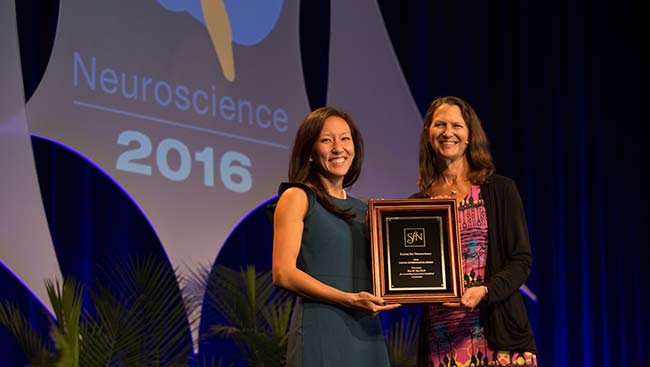Getting What You Want Through Mentorship, Self-Reflection, and Hobbies

Kay Tye’s pioneering work with projection-specific optogenetics has built a strong foundation for future insights into healthy and addiction-related behaviors. By understanding the neural circuitry that interprets pleasure and pain, she was able to alter the activity of certain connection bundles in mice and change their anxiety levels. For this work, she was awarded the Young Investigator Award in 2016. Here, in part two of her interview (read part one, Defining Success for Your Research — and Life), she discusses mentorship and offers advice to trainees.
In Nature you said, “I never thought that my life had to be limited, and I want to set that example for my daughter.” How have role models or mentors positively affected your career?
I have been very fortunate to have great role models and mentors throughout my life. My mother is a scientist who came up in a time when the ratio of men to women in her field was 10 to 1. My PhD adviser, Patricia Janak, has been a great role model and mentor, setting an example of how to balance different aspects of her life.
I have also had supportive male mentors who have had a tremendous, positive impact on me, including Antonello Bonci and Karl Deisseroth. A number of fantastic female scientists with whom I haven’t worked but value as colleagues have also been inspirational, including Sheena Josselyn, Cori Bargmann, Marina Picciotto, and Li-Huei Tsai. Particularly in recent years, some peer colleagues who have set fantastic examples and helped enlighten me about implicit bias issues are Anne Churchland, Yael Niv, and Ilana Witten.
I have to say that my perspective on implicit bias has dramatically changed over the past 4-5 years. While I remain optimistic and do stand by the statement from the Nature interview, at the time in early 2013, I was not as aware of implicit bias as I am now. I think that my experience is not uncommon, as many of my peers have expressed similar experiences — that when they were graduate students or postdocs, they felt the impact of implicit bias far less.
The reason I didn’t realize it before was because I had implicit bias, too. I didn’t notice other people having it because I was viewing the world through the same, biased lens. I would never have said at any point in my life that I felt that women were in anyway inferior to men — so I never had explicit bias — but it is sort of impossible to deny the social programming that we are born into and raised in.
Even though I consider my life quite privileged, I have frequently felt that I wasn’t smart or capable enough, and that self-doubt was at least partially related to the implicit bias that I had internalized. At certain points in my career, as an undergrad and grad student, and even as a junior faculty member, I have really struggled with feelings of inadequacy. I think that is a greater challenge for underrepresented minorities.
Promoting diversity corrects the systemic and personal biases that impact individuals over the course of their lifetime, providing them effectively equal access to opportunities and allowing our scientific community to be a more complete reflection of our diverse society. Particularly in a job where being both creative and practical is important, diverse perspectives, experiences, and approaches that help problem solving are essential.
Finally, academic research is one of the last vestiges of the “master-apprentice” crafts that takes so long to master that a permanent bond can be formed. For me, the mentor-mentee relationship is sacred, and one of the aspects I cherish most about this career path. There is no way I will ever be able to repay all my mentors and role models for the incredible positive impact that they have had on me, so the best I can do is to pay it forward to the next generation.
What have you learned from making time to mentor trainees and bring science training and awareness to underrepresented girls through Science Club for Girls?
Working with the Science Club for Girls is so rewarding. Some of the girls are surprised that I am a scientist. I explain what I do every day and why becoming a scientist simply starts with being curious about how things work and asking the right questions.
Just the exposure to someone who is a scientist and relatable can be enough to make the girls feel that being a scientist is one of their options. One of the most important ways to promote diversity is for those of us who are underrepresented minorities to be as visible as possible.
What advice on finding a healthy work-life balance would you give trainees?
Remember to always reflect on what makes you happy and what you enjoy. It is great to have other interests. Abundant data have shown that environmental enrichment is good for our brains, so why wouldn’t we incorporate this into our own lives?
There are many times when I am working very hard and am having fun. There are other times when I’m working hard and not having fun. During that time, I will still fulfill my commitments but use that experience to help me say no to future commitments that I will probably not enjoy. This is a learning process, and the things that interest me are dynamic, both within and beyond science.
However, trainees should be honest with themselves about whether they truly enjoy scientific research. I caution trainees that a career in academia is not for everyone. There are many ways to bring value to the world, and every part of the scientific ecosystem is important.
Throughout my career, I have always had outside interests, such as breakdancing, rock climbing, snowboarding, and trying new things. Recently, I even went with my sister to a flying trapeze class. For the most part, though, these days I have fewer hobbies, but more kids — and I really enjoy being with my family. Now, I spend countless hours cuddling or pretending I’m a safari animal.
While it’s impossible to do a controlled experiment, I am confident that having interests outside of science are helping me be happy and successful, at least by my definition of success.
Read part one of Kay Tye’s interview, Defining Success for Your Research — and Life.
Speaker






